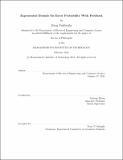Exponential bounds on error probability with Feedback
Author(s)
Nakiboḡlu, Bariş
DownloadFull printable version (1.120Mb)
Other Contributors
Massachusetts Institute of Technology. Dept. of Electrical Engineering and Computer Science.
Advisor
Lizhong Zheng.
Terms of use
Metadata
Show full item recordAbstract
Feedback is useful in memoryless channels for decreasing complexity and increasing reliability; the capacity of the memoryless channels, however, can not be increased by feedback. For fixed length block codes even the decay rate of error probability with block length does not increase with feedback for most channel models. Consequently for making the physical layer more reliable for higher layers one needs go beyond the framework of fixed length block codes and consider relaxations like variable-length coding, error- erasure decoding. We strengthen and quantify this observation by investigating three problems. 1. Error-Erasure Decoding for Fixed-Length Block Codes with Feedback: Error-erasure codes with communication and control phases, introduced by Yamamoto and Itoh, are building blocks for optimal variable-length block codes. We improve their performance by changing the decoding scheme and tuning the durations of the phases, and establish inner bounds to the tradeoff between error exponent, erasure exponent and rate. We bound the loss of performance due to the encoding scheme of Yamamoto-Itoh from above by deriving outer bounds to the tradeoff between error exponent, erasure exponent and rate both with and without feedback. We also consider the zero error codes with erasures and establish inner and outer bounds to the optimal erasure exponent of zero error codes. In addition we present a proof of the long known fact that, the error exponent tradeoff between two messages is not improved with feedback. 2. Unequal Error Protection for Variable-Length Block Codes with Feedback: We use Kudrayashov's idea of implicit confirmations and explicit rejections in the framework of unequal error protection to establish inner bounds to the achievable pairs of rate vectors and error exponent vectors. Then we derive an outer bound that matches the inner bound using a new bounding technique. As a result we characterize the region of achievable rate vector and error exponent vector pairs for bit-wise unequal error protection problem for variable-length block codes with feedback. Furthermore we consider the single message message-wise unequal error protection problem and determine an analytical expression for the missed detection exponent in terms of rate and error exponent, for variable-length block codes with feedback. 3. Feedback Encoding Schemes for Fixed-Length Block Codes: We modify the analysis technique of Gallager to bound the error probability of feedback encoding schemes. Using the encoding schemes suggested by Zigangirov, D'yachkov and Burnashev we recover or improve all previously known lower bounds on the error exponents of fixedlength block codes.
Description
Thesis (Ph. D.)--Massachusetts Institute of Technology, Dept. of Electrical Engineering and Computer Science, 2011. This electronic version was submitted by the student author. The certified thesis is available in the Institute Archives and Special Collections. Cataloged from student submitted PDF version of thesis. Includes bibliographical references (p. 95-97).
Date issued
2011Department
Massachusetts Institute of Technology. Department of Electrical Engineering and Computer SciencePublisher
Massachusetts Institute of Technology
Keywords
Electrical Engineering and Computer Science.